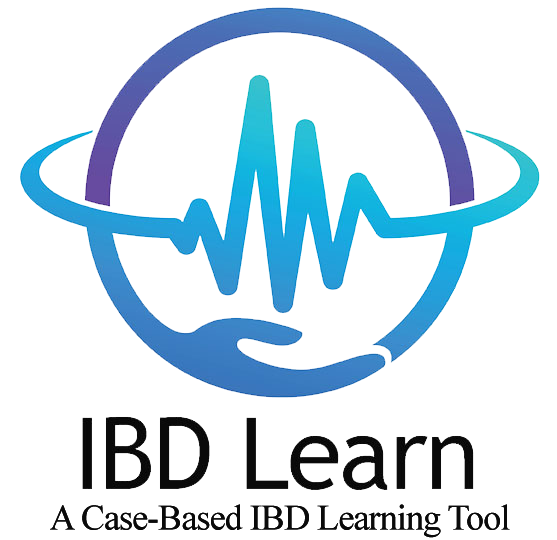Learning Objectives
- Perform an evaluation for the patient hospitalized with Crohn’s colitis flare.
- Choose appropriate biologic therapy for the patient with severe Crohn’s disease with prior anti-TNF exposure.
- Utilize early therapeutic drug monitoring when reintroducing infliximab in the patient with prior infliximab exposure.
EPAs
- EPA 1: Classify IBD phenotype, disease activity, and extraintestinal manifestations
- EPA 2: Use advanced diagnostic and therapeutic endoscopic and radiographic techniques in the management of IBD
- EPA 3: Prescribe and manage evidenced-based IBD therapies using clinical pharmacologic principles in clinical practice
- EPA 4: Manage adverse events and complications of IBD and IBD therapies
- EPA 5: Manage hospitalized patients with IBD
Discussion
This case describes a patient with intermittent prior infliximab treatment, with no history of loss of response, presenting with a severe flare of Crohn’s colitis.
Initial work-up confirms a severe flare of Crohn’s colitis limited to the rectum and sigmoid colon, with no evidence of infectious or penetrating complications. IV steroids are appropriate initial therapy, and a biologic agent is also warranted. Infliximab has the most robust evidence for severe or fulminant Crohn’s disease. Efficacy of other anti-TNF agents is less certain in the hospitalized patient. Ustekinumab and vedolizumab are both options for induction and maintenance in moderate-to-severe Crohn’s disease, and may be used in patients with prior anti-TNF exposure. However, the current ACG guidelines for Crohn’s disease note that vedolizumab may have less efficacy especially in patients with prior anti-TNF exposure [1]. Ustekinumab would be a reasonable choice in this scenario, though this patient’s social situation may favor an IV therapy. Cyclosporine has not demonstrated efficacy in Crohn’s disease and should not be used. As the patient previously had good response to infliximab, had no history of loss of response, and preferred IV therapy, and given the robust evidence base for infliximab in severe Crohn’s disease, re-treatment with infliximab was chosen. Methotrexate was also prescribed to decrease the risk of antidrug antibody formation, but azathioprine is also a reasonable choice
The primary concern when reintroducing infliximab after prior episodic treatment is development of antidrug antibodies, which may lead to infusion reactions or loss of response. A 2014 retrospective single-center consecutive series of patients restarting infliximab provides some data to guide management in this scenario [2]. In a population where 22% discontinued infliximab due to prior infusion reaction or loss of response, reinitiation produced a response in 85% at week 14; prior discontinuation in remission was associated with higher likelihood of response. On reinitiation, 45% of patients had a week 0, 2, 6 induction regimen followed by maintenance, while the remainder had maintenance therapy alone. Only 5 mg/kg doses were used. 65% were given combination therapy with an immunomodulator. While no improvement in response rate was observed with use of an induction regiment or IV steroid prophylaxis, immunomodulator co-treatment was associated with significantly higher response rate than infliximab alone. All patients receiving infliximab at this center had routine serum samples taken before each infusion. Higher infliximab trough levels early during induction or before first maintenance infusion were associated with higher response rates, and lower likelihood of infusion reactions; immunomodulator co-therapy decreased the likelihood of infusion reaction and attenuated the difference in response rates between quartiles of drug level. Detectable antidrug antibody early in induction or before first maintenance dose was associated with decreased likelihood of response. While there is no clear protocol in this situation, our usual practice for infliximab reinitiation is to start with maintenance therapy if within 6-12 months of the last dose or do a slower induction with 5 mg/kg at weeks 0, 4, 8, with immunomodulator, and with monitoring for development of antidrug antibodies between each induction dose and a trough level prior to the first maintenance infusion.
References
- Lichtenstein GR et al. ACG Clinical Guideline: Management of Crohn’s Disease in Adults. Am J Gastroentrol 2018;113(4):481-517.
- Baert F et al. Early Trough Levels and Antibodies to Infliximab Predict Safety and Success of Reinitiation of Infliximab Therapy. Clin Gastronentrol Hepatol 2014;12:1474-1481.
Click here to move on to the post test
Click here to return to the start of the case
